To facilitate communication and exchange, a “Microcontroller (MCU) Market Exchange Group” has been established, which can be joined by applying through “Read the original text“
Introduction
The microcontroller (MCU) has been widely used since its inception in the 1970s, undergoing over forty years of development. The rapid growth of the Chinese market has attracted more and more MCU companies, including many local MCU design firms. In a market filled with brands, effective marketing becomes particularly important for gaining market share.
The prosperity of a product is aligned with market demand. Marketing must continuously meet the growing and changing market needs. Unlike standard components, microcontrollers have relatively complex hardware and software system designs, which makes their marketing different. This article briefly discusses several aspects of marketing MCU products.
Sales Channels
MCU sales channels can generally be divided into direct sales and distribution or agency sales. Direct sales refer to MCU manufacturers selling products directly to end customers, typically OEMs/ODMs or significant industry clients. Distribution or agency sales involve MCU manufacturers selling products to distributors or agents, who then sell to customers. For clients with expertise in specific market areas, MCU manufacturers may also engage them as IDHs (Independent Design Houses) or partners, supporting the sales of their MCU products and enhancing their influence in niche markets.
The following diagram illustrates an MCU sales channel: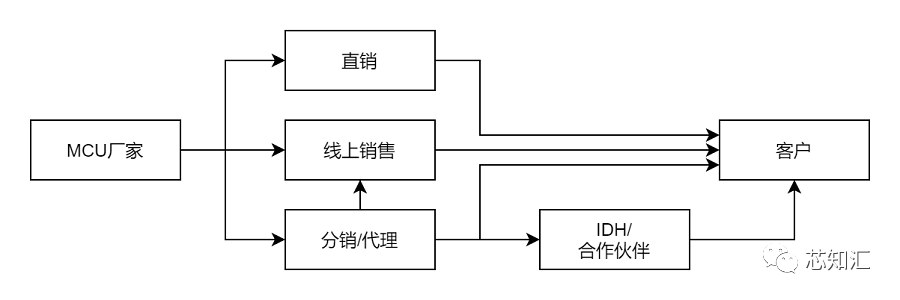 With the popularity of the internet and the development of e-commerce platforms, some MCU manufacturers have begun to establish online sales channels, providing customers with a direct procurement route to the official source. Online sales channels can meet customer needs in areas such as development tools and small-batch production. On the other hand, online sales also help MCU manufacturers directly understand customer demands.
With the popularity of the internet and the development of e-commerce platforms, some MCU manufacturers have begun to establish online sales channels, providing customers with a direct procurement route to the official source. Online sales channels can meet customer needs in areas such as development tools and small-batch production. On the other hand, online sales also help MCU manufacturers directly understand customer demands.
University Programs
University programs aim to cultivate electronic engineering talent in the education sector by providing relevant product resources and support, enriching students’ engineering practice experience, and enhancing the research and innovation capabilities of teachers and students. After graduation, students will enter society and become potential developers of the products they use. The integration of industry, academia, and research outputs innovative results, achieving productization and industrialization, serving enterprises and society. The collaboration between MCU manufacturers and universities is mutually beneficial.
The following diagram outlines some aspects of university programs: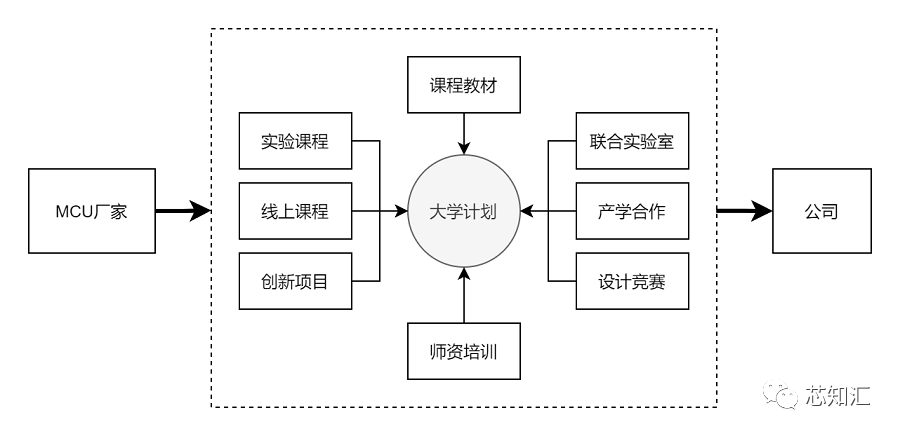 The relevant content of university programs includes:
The relevant content of university programs includes:
-
Course Materials – Systematic in-depth learning of product knowledge and applications through textbooks.
-
Laboratory Courses – Hands-on experiments to strengthen understanding and application of product textbook content, enhancing practical skills.
-
Online Courses – Learning can be arranged freely without restrictions of time and distance.
-
Innovation Projects – Through school-enterprise cooperation, cultivate students’ innovative application projects and develop innovative thinking.
-
Teacher Training – Teaching to fish, cultivating more teachers to educate students.
-
Design Competitions – Collaborating with schools to host electronic design competitions, stimulating students’ innovative vitality.
-
Industry-Academia Cooperation – Promoting technology transfer through project cooperation and school-enterprise linkage.
-
Joint Laboratories – MCU manufacturers provide relevant product resources, technical support, and training to cultivate professionals.
According to statistics from the Ministry of Education, in 2019, the total scale of higher education in China reached 40.02 million, with 7.585 million graduates from regular undergraduate programs, 640,000 master’s graduates, and 63,000 doctoral graduates. A significant portion of these are students majoring in electronic engineering, making university programs a competitive focus for many MCU manufacturers.
Ecological System
According to Baidu Baike, an ecological system refers to a unified whole formed by organisms and their environment within a certain space in nature, where organisms and the environment mutually influence and restrict each other, maintaining a relatively stable dynamic balance over a certain period.
Generally, an MCU ecological system can be illustrated as follows: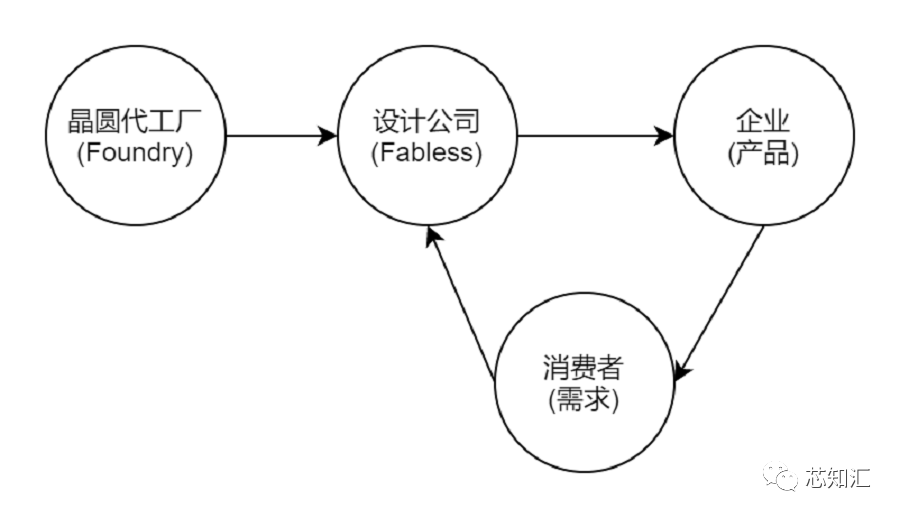 Foundries manufacture MCU products for design companies (Fabless), while design companies design MCUs based on market consumption demands, and enterprises select MCUs to design their products accordingly.
Foundries manufacture MCU products for design companies (Fabless), while design companies design MCUs based on market consumption demands, and enterprises select MCUs to design their products accordingly.
In the early days of MCU products, due to their simple functions, manufacturers provided product documentation and assembly compilers for product development. However, as MCU products have become more feature-rich and performance has improved, developers face increasing challenges in product design. To provide better development resources and services for product design and accelerate product development and market launch, MCU manufacturers are placing greater emphasis on building ecological systems.
From the perspective of product development needs, the ecological system for MCU developers can be illustrated as follows: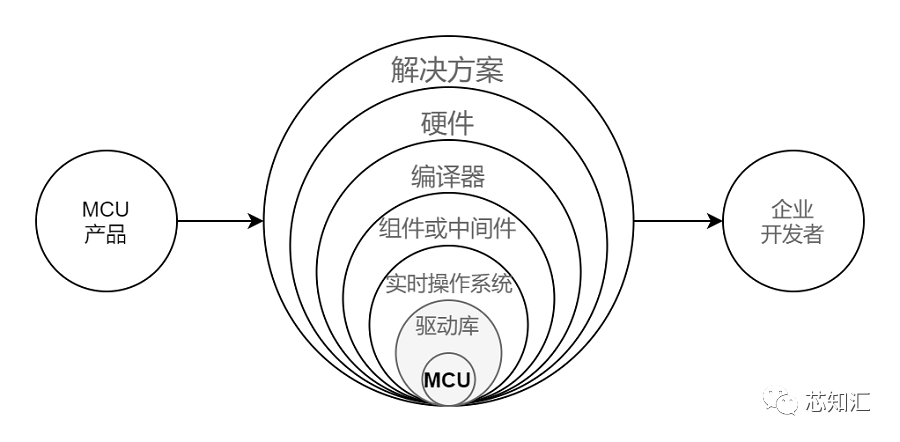 Driver Libraries: Generally, MCU manufacturers provide low-level driver libraries for developers to use.
Driver Libraries: Generally, MCU manufacturers provide low-level driver libraries for developers to use.
Real-Time Operating Systems (RTOS): RTOS is system software that manages and schedules MCU resources, suitable for designs with more complex tasks, reducing the complexity and cost of system design.
Components or Middleware: Components or middleware implement specific software functions, such as file management and GUI, which can accelerate software system design.
Compilers: Compilers are software tools that compile high-level languages or assembly language mnemonics into machine language, essential for product development.
Hardware: MCU manufacturers’ hardware boards are generally designed based on product characteristics to help customers quickly understand product features. Open-source hardware is suitable for rapidly building product prototypes, such as Arduino.
Solutions: To meet the application needs of industry clients, MCU manufacturers provide certain solutions either independently or in collaboration with third parties, which helps promote product adoption.
Collaboration with the above parties or companies helps MCU manufacturers build a comprehensive and rich ecological system, better serving and meeting the diverse development needs of developers.
An MCU ecological system does not exist in isolation; it is closely connected with the ecological systems of related parties, interdependent and mutually developing, as illustrated below: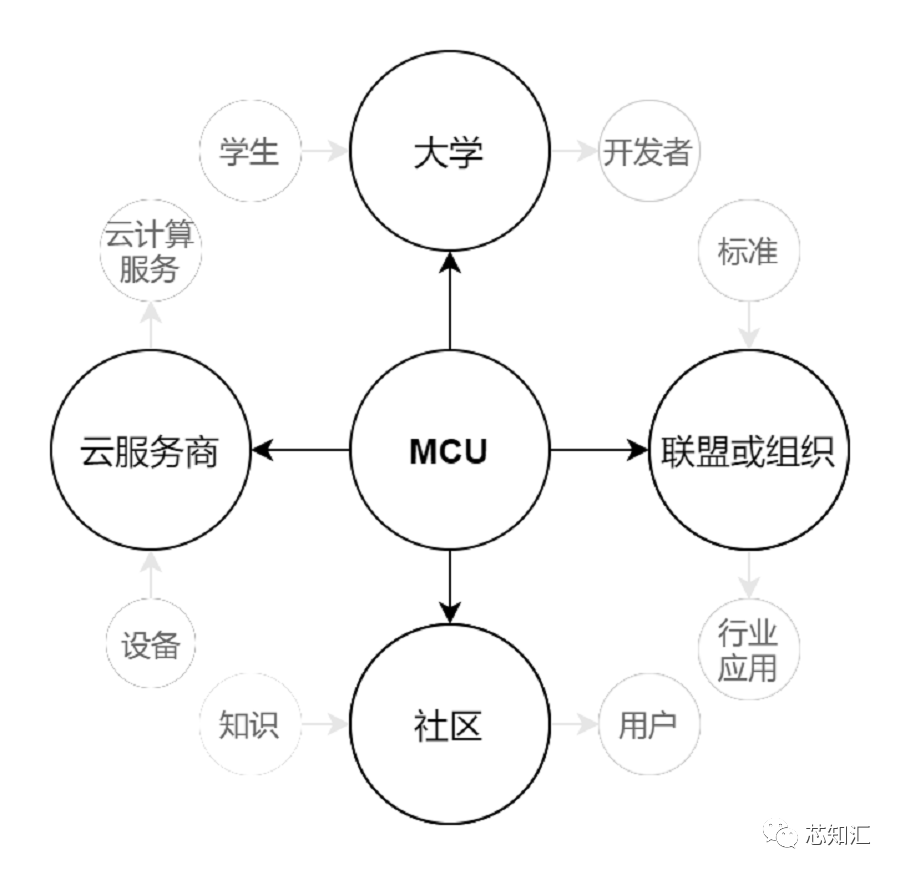
Collaborating with different service providers, communities, organizations, or units to provide multi-level product development resources for enterprise developers helps build a richer ecological system.
Knowledge Marketing
According to Baidu Baike, knowledge marketing is the process of effectively disseminating valuable knowledge owned by a company to potential users, gradually forming recognition of the company’s brand and products, and converting potential users into actual users through various marketing activities.
Here, we refer to knowledge marketing primarily in the MCU field, providing developers with valuable product and application knowledge, establishing an understanding of products and their characteristics, and meeting their product development needs to achieve marketing objectives.
Knowledge dissemination can take various forms, commonly illustrated as follows: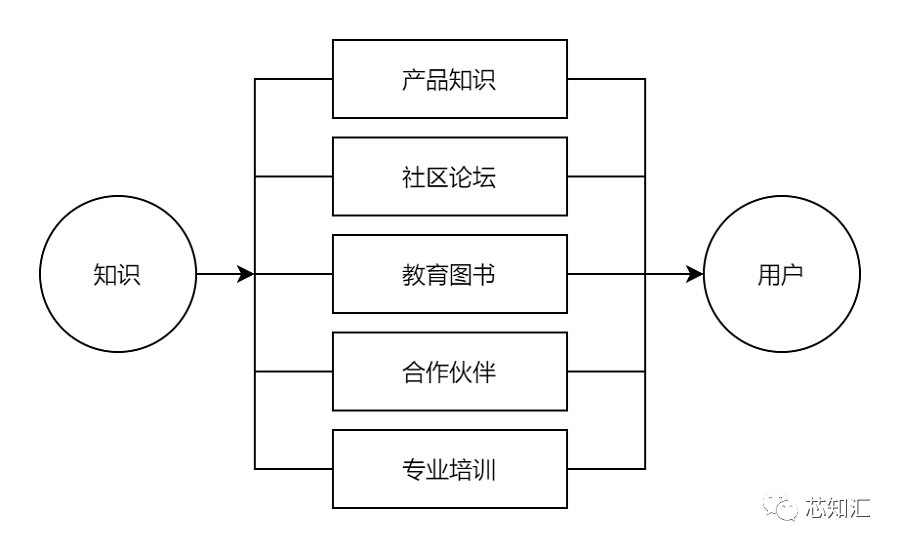
Product Knowledge: MCU manufacturers provide users with product knowledge through various forms, such as dedicated product manuals and application notes on their websites; online/offline seminars for product promotion; and online product training. Due to the proliferation of the internet and the impact of the pandemic, online communication has become increasingly common, saving the hassle of travel. Product documentation and information online are often scattered, making it necessary to establish and improve a systematic product knowledge base for developers’ reference and use.
Community Forums: Community forums provide a platform for developers to exchange and inquire about products. Some open-source communities offer more specialized learning and exchange circles, and collaborating with them can enhance product influence. Community forums are conducive to content accumulation, and when combined with search engines, relevant content can be easily found.
Educational Books: Books are carriers of knowledge. MCU manufacturers collaborate with schools or enterprises to publish books to facilitate better systematic learning and usage of products by students and developers.
Partners: Each has its strengths and weaknesses. MCU manufacturers collaborate with specialized partners in certain fields to promote the application of new products and technologies, which can cultivate new markets or specialized application markets. Developers can more easily access professional knowledge, enhancing their product development capabilities.
Professional Training: With technological advancements and product development, the number of MCU developers is increasing. Experts or training institutions can provide professional learning for developers or newcomers, enabling them to acquire knowledge and skills necessary for developing new products.
Product development relies on the accumulation of knowledge, and relevant product knowledge is transmitted to developers through various channels, allowing them to utilize MCUs for product development, thereby promoting MCU product sales.
MCU marketing is an educational process, and the educational process is also a knowledge dissemination process.
Recommended Reading
-
Overview of Chinese Microcontroller (MCU) Companies (2021)
-
China Wireless MCU Market Brief (2020)
-
2020 Import and Export Situation of Processors and Controllers in China
-
China General Microcontroller (MCU) Market Brief (2020)
-
Ultra-Low Power Microcontroller (ULP MCU) Market Brief

To facilitate communication and exchange, a “Microcontroller (MCU) Market Exchange Group” has been established, which can be joined by applying through “Read the original text“